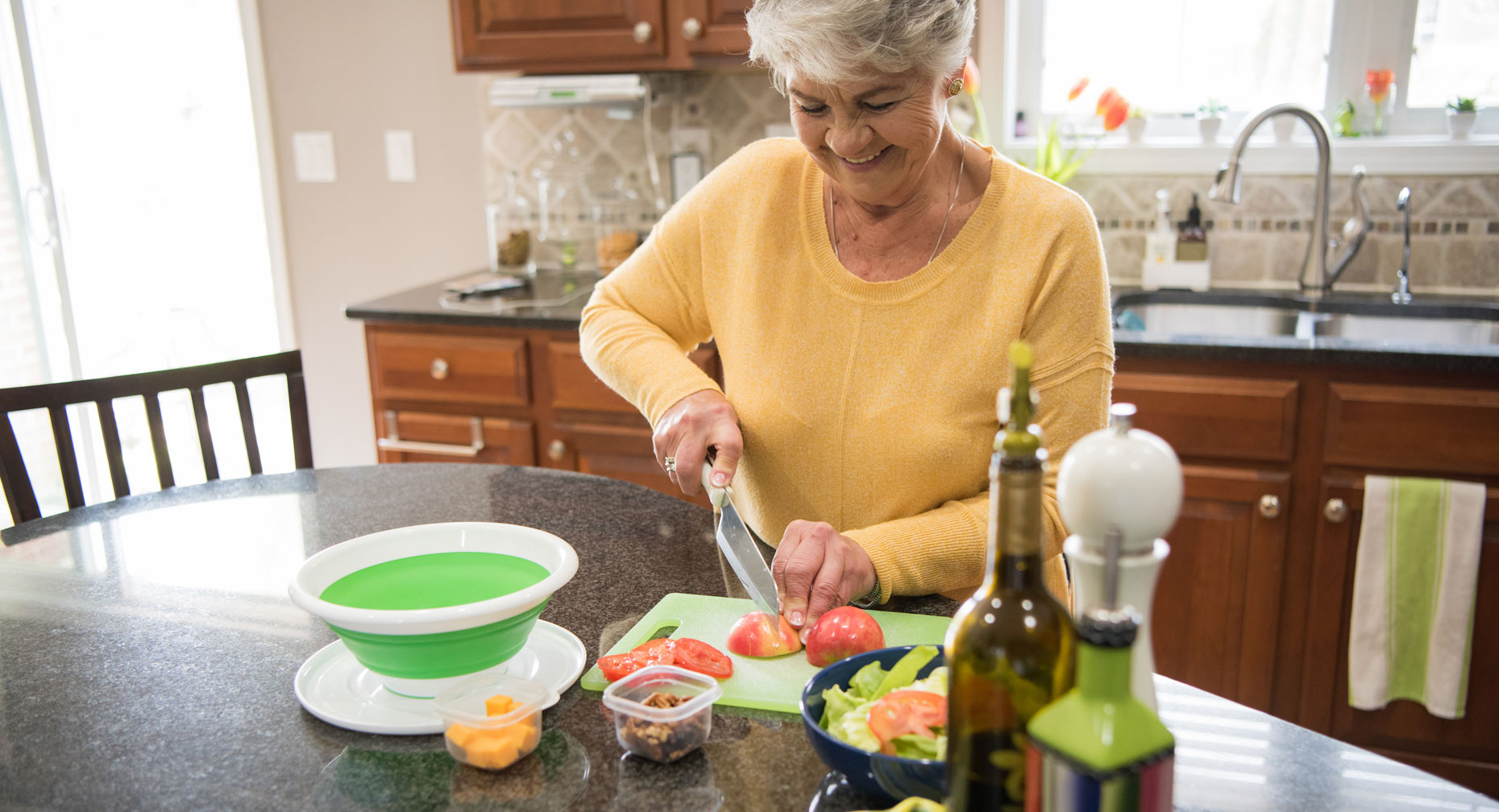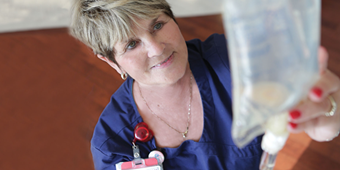Understanding Stomach Cancer

Answer a few questions and we'll provide you with a list of primary care providers that best fit your needs.
Stomach cancer accounts for about 1.5 percent of all newly diagnosed cancers. The American Cancer Society estimates that in 2020, about 27,600 people in the U.S. will be diagnosed with stomach cancer and about 11,000 people will die from it.
As with all cancers, stomach cancer involves cells that start to change, grow and multiply in an unpredictable manner, often forming tumors. Most stomach cancers start in the inner layer, or lining, of the stomach, the mucosa. The mucosa is where stomach acid and digestive enzymes are made.
Stomach cancer cells can eventually spread from the inner layer, to the muscle layer of the stomach, and to the stomach’s outer layer. From there, the cells can spread to nearby organs or other parts of the body.
Matthew Doepker, MD, with Premier Surgical Oncology explains that cancer that spreads is more difficult to treat than cancer that is confined to one location. That’s why the earlier it’s found, the better your chances for recovery.
Are You At Risk For Stomach Cancer?
A risk factor means something that might increase your chances of having a disease. In the case of stomach cancer, known risk factors include:
- Genetics. “Some people were born with genes that increase their likelihood of getting stomach cancer,” explains Dr. Doepker. “These people have the greatest risk of getting it.”
- Gender. More men than women get stomach cancer.
- Age. Stomach cancer rates go up in people older than 50. Most cases of stomach cancer show up in people between their late 60s and 80s.
- Ethnicity. In the U.S., the disease is more common among Hispanic Americans, African Americans, Native Americans, and Asian/Pacific Islanders than for non-Hispanic whites.
- Diet. “If your diet is high in salt or smoked meats, or if overall your dietary habits are not good, your risk is increased,” says Dr. Doepker. According to the American Cancer Society, eating lots of fresh fruits and vegetables has been found to lower the risk of stomach cancer.
- Weight. “If you’re obese, your risk of developing stomach cancer is greater,” says Dr. Doepker.
- Tobacco. A smoker’s risk of getting stomach cancer is about double that of a nonsmoker.
- Helicobacter pylori (H. pylori) infection. Although most people who carry this bacterium don’t develop cancer, it has been found to be a major cause of stomach cancer.
- Pernicious anemia. If you have this type of anemia, which is caused by a vitamin B12 deficiency, your risk of stomach cancer is increased.
- Gastric polyps. These are usually noncancerous growths on the lining of the stomach, but certain kinds can develop into cancer.
“The most important thing you can do to reduce your chance of developing stomach cancer is to reduce these risks. Try to exercise more, eat healthy,” advises Dr. Doepker. “Stop using tobacco products, take Vitamins A and C, as well as antioxidants that have been shown to decrease the risk of stomach cancer.”
What Are the Symptoms Of Stomach Cancer?
In its earliest stages, stomach cancer typically does not cause noticeable symptoms. “Some of the first signs can be when you’re eating you get the feeling that you’re full much sooner than usual, like after just a few bites,” says Dr. Doepker. Other early symptoms include:
- Bloating or swelling of the belly
- Pain in the belly area
Later signs of stomach cancer include:
- Unintentional weight loss
- Loss of appetite
- Lack of energy
- Fatigue
- Nausea and/or vomiting
- Blood in your stool
- Indigestion
These problems can often be caused by conditions other than cancer. But if you’re experiencing symptoms like these, and they’re not going away, see your doctor for an examination.
How Is Stomach Cancer Diagnosed?
Diagnosing stomach cancer usually begins with a discussion with your doctor or other health care provider, who will ask questions about your symptoms and medical history and perform a physical examination. The next step in diagnosis involves testing. Some or all of the following tests might be used:
- Blood tests. A low red blood cell count could indicate you are bleeding in your stomach. Blood tests are also useful in assessing your overall health and detecting other problems.
- Fecal occult blood test. This test checks for small amounts of blood that may be in your stool, which can be a sign of cancer (or other conditions).
- Endoscopy. This procedure involves a doctor or other health care professional looking down into your stomach and nearby structures with an endoscope, a thin, flexible lighted tube with a tiny camera on the end. You will be sedated for this test.
- Barium swallow (upper GI). In this test, you first drink a fluid with barium in it. The barium lines your stomach, which helps doctors see it more clearly on the X-ray.
- CT scan. In this procedure pictures are taken of specific areas inside your body, including the stomach.
- Biopsy. Your doctor will remove a small tissue sample from a suspicious area in your stomach and have it tested to determine if it is cancer. The biopsy may be taken through a small incision in your skin or with the use of special tools in combination with an endoscope.
How Is Stomach Cancer Treated?
If tests confirm that you have stomach cancer, your health care provider will talk with you about the best options in your specific case. The type of treatment recommended will be based on many factors, including the location of your cancer and its stage of development. Options for treatment include:
- Surgery to remove the cancer, and some of the tissue surrounding it
- Chemotherapy — targeting and killing cancer cells using strong drugs
- Radiation therapy — killing cancer cells with directed rays of energy
The doctors on your health care team will likely include a digestive system specialist (gastroenterologist) and one or more cancer specialists (oncologists).
What Are the Chances Of Recovering From Stomach Cancer?
Your chance of recovering from stomach cancer is higher if you catch it early, says Dr. Doepker. If it’s found in a later stage, it is usually not curable, though it can be treated. “Compared to other cancers, the prognosis is poor,” he says. “The five-year survival rate is about 32 percent. That means that five years after being diagnosed, only 32 percent of patients are still alive.”
To learn more about stomach cancer, talk to your doctor or health care provider or search for a provider.
Answer a few questions and we'll provide you with a list of primary care providers that best fit your needs.
Source: American Cancer Society; National Cancer Institute; Matthew P. Doepker, MD, Premier Surgical Oncology





